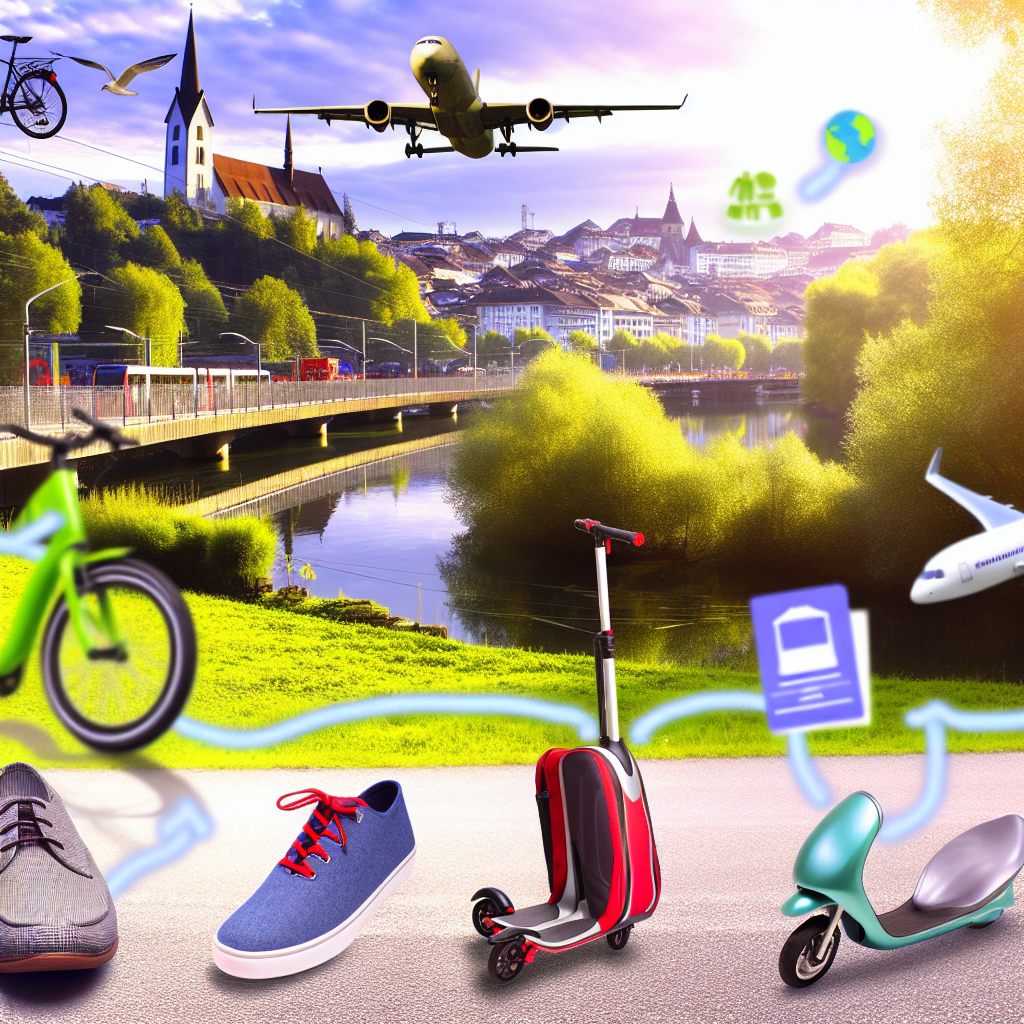-
Table of Contents
Exploring the World on a Shoestring Budget: Eco-Friendly Travel Hacks
Traveling is a wonderful way to explore the world and experience new cultures, but it can also be expensive. However, with a little bit of planning and some eco-friendly travel hacks, you can save money while still enjoying all that the world has to offer.
One of the first things you can do to save on travel expenses is to be flexible with your travel dates. By being open to traveling during off-peak times, you can often find cheaper flights and accommodations. Not only will this save you money, but it will also help reduce your carbon footprint by avoiding crowded tourist seasons.
Another way to save on travel expenses is to consider alternative accommodations. Instead of staying in expensive hotels, why not try staying in a local guesthouse or renting a room through a home-sharing platform? Not only will this give you a more authentic experience, but it will also be more budget-friendly. Plus, by staying with locals, you can learn more about the culture and support the local economy.
When it comes to transportation, opting for public transportation or walking can save you a significant amount of money. Instead of renting a car or taking taxis everywhere, try using buses, trains, or even bicycles to get around. Not only will this save you money, but it will also reduce your carbon footprint and allow you to experience the destination from a different perspective.
Eating out can be a major expense while traveling, but there are ways to save money on food without sacrificing taste or quality. One option is to eat at local markets or street food stalls, where you can find delicious and affordable meals. Not only will this save you money, but it will also give you the opportunity to try authentic local cuisine. Additionally, consider packing snacks or making your own meals when possible to save even more.
Another eco-friendly and wallet-friendly travel hack is to pack light. By traveling with just a carry-on bag, you can avoid checked baggage fees and save money. Additionally, packing light reduces the weight of your luggage, which can help reduce fuel consumption and carbon emissions during transportation.
If you’re looking to save on activities and attractions, consider researching free or low-cost options in the destination you’re visiting. Many cities offer free walking tours, museums with discounted or free admission on certain days, and outdoor activities that don’t require an entrance fee. By taking advantage of these options, you can still have a fulfilling travel experience without breaking the bank.
Lastly, consider traveling to destinations that are closer to home. Not only will this save you money on flights, but it will also reduce your carbon footprint by minimizing the distance you need to travel. Exploring your own country or neighboring countries can be just as rewarding as traveling to far-flung destinations.
In conclusion, traveling on a shoestring budget doesn’t mean you have to sacrifice your eco-friendly values. By being flexible with your travel dates, opting for alternative accommodations, using public transportation, eating local, packing light, and seeking out free or low-cost activities, you can save money while still enjoying all that the world has to offer. So go ahead, explore the world on a shoestring budget and make a positive impact on the environment at the same time.
Budget-Friendly Travel Tips for the Eco-Conscious
Traveling can be an exciting and enriching experience, but it can also be expensive. However, being eco-conscious doesn’t have to break the bank. With a little planning and some smart choices, you can save money while still being kind to the environment. Here are some budget-friendly travel tips for the eco-conscious traveler.
One of the first things you can do to save money and reduce your carbon footprint is to choose eco-friendly transportation options. Instead of flying, consider taking a train or a bus. Not only are these modes of transportation often cheaper, but they also emit fewer greenhouse gases. If you’re traveling within a city, opt for public transportation or rent a bike instead of taking taxis or renting a car. This not only saves you money on gas and parking fees but also helps reduce traffic congestion and air pollution.
When it comes to accommodation, there are plenty of eco-friendly options that won’t break the bank. Look for hotels or guesthouses that have implemented sustainable practices, such as using renewable energy sources, recycling, and conserving water. Many eco-friendly accommodations also offer lower rates during off-peak seasons, so be sure to take advantage of those deals. If you’re open to more adventurous options, consider camping or staying in eco-lodges or homestays. These alternatives not only save you money but also allow you to immerse yourself in nature and support local communities.
Eating out can be a significant expense while traveling, but there are ways to save money and be eco-friendly at the same time. Instead of dining at expensive restaurants, explore local markets and street food stalls. Not only will you get a taste of authentic cuisine, but you’ll also support local vendors and reduce food waste. Additionally, try to eat vegetarian or vegan meals whenever possible. The production of meat and dairy products has a significant environmental impact, so opting for plant-based options can help reduce your carbon footprint and save you money.
Another way to save money and be eco-conscious is to pack light. Many airlines charge extra fees for checked baggage, so traveling with just a carry-on can save you a substantial amount of money. Additionally, packing light means less weight for planes, trains, or buses to carry, which reduces fuel consumption and emissions. Choose versatile clothing items that can be mixed and matched, and pack travel-sized toiletries to minimize waste.
While exploring your destination, consider engaging in eco-friendly activities. Instead of taking guided tours in large groups, opt for self-guided tours or small-group excursions. This not only allows you to have a more personalized experience but also reduces the environmental impact of mass tourism. Look for activities that promote sustainable practices, such as hiking, biking, or wildlife conservation projects. These activities often cost less than more touristy options and allow you to connect with nature and local communities.
Lastly, don’t forget to be mindful of your energy and water consumption while traveling. Turn off lights and air conditioning when you leave your accommodation, and take shorter showers to conserve water. These small actions not only save you money but also contribute to the overall sustainability of your trip.
In conclusion, being eco-conscious doesn’t mean you have to spend a fortune while traveling. By making smart choices and being mindful of your impact on the environment, you can save money and have a more sustainable travel experience. From choosing eco-friendly transportation and accommodation to eating local and engaging in eco-friendly activities, there are plenty of budget-friendly options for the eco-conscious traveler. So go ahead, explore the world while being kind to your wallet and the planet.
10 Eco-Friendly Ways to Save on Travel Expenses
Traveling can be an exciting and enriching experience, but it can also be expensive. From transportation to accommodation and meals, the costs can quickly add up. However, there are ways to save on travel expenses while also being eco-friendly. By making a few simple changes to your travel habits, you can not only reduce your carbon footprint but also save some money along the way.
1. Plan your trip in advance: One of the easiest ways to save on travel expenses is to plan your trip well in advance. By booking your flights and accommodations early, you can often take advantage of lower prices. Additionally, planning ahead allows you to research and find the most eco-friendly options available.
2. Choose eco-friendly accommodations: When selecting your accommodations, opt for eco-friendly hotels or guesthouses. These establishments often have energy-efficient practices in place, such as using renewable energy sources and implementing water-saving measures. Not only will you be reducing your environmental impact, but you may also find that these accommodations offer competitive prices.
3. Pack light: Another way to save on travel expenses is to pack light. Many airlines charge extra fees for checked baggage, so by packing only what you need in a carry-on, you can avoid these additional costs. Additionally, packing light reduces the weight of the plane, which in turn reduces fuel consumption and carbon emissions.
4. Use public transportation: Instead of renting a car or taking taxis, consider using public transportation whenever possible. Many cities have efficient and affordable public transportation systems that can take you to all the major tourist attractions. Not only will you save money on transportation costs, but you will also reduce your carbon footprint by opting for a greener mode of travel.
5. Walk or bike: If the distance is manageable, consider walking or biking instead of using public transportation. Not only is this a great way to save money, but it also allows you to explore the city at a slower pace and truly immerse yourself in the local culture. Plus, it’s an excellent way to stay active while on vacation.
6. Eat like a local: Dining out can quickly become a significant expense while traveling. To save money, try eating like a local. Explore local markets and grocery stores to buy fresh produce and ingredients, and prepare your meals in your accommodations. Not only will you save money, but you will also have the opportunity to try local cuisine and support local businesses.
7. Stay in eco-friendly destinations: When choosing your travel destinations, consider places that prioritize sustainability and eco-tourism. These destinations often have a wide range of eco-friendly activities and accommodations available, allowing you to have a memorable and environmentally conscious trip.
8. Use reusable water bottles and bags: Instead of buying bottled water and using plastic bags, bring your reusable water bottle and shopping bags. Many destinations have water refill stations, and by using your own bottle, you can save money and reduce plastic waste. Similarly, bringing your own bags helps reduce the demand for single-use plastic bags.
9. Support local businesses: When traveling, make an effort to support local businesses. By eating at local restaurants, shopping at local markets, and booking tours with local operators, you not only contribute to the local economy but also have the opportunity to experience the authentic culture of your destination. Additionally, local businesses often offer more affordable prices compared to tourist-oriented establishments.
10. Take advantage of free activities: Many destinations offer a variety of free activities and attractions. Research your destination beforehand to find out about free walking tours, museums with free admission days, or parks and beaches where you can relax and enjoy nature without spending a dime. By taking advantage of these opportunities, you can save money while still having a memorable travel experience.
By implementing these eco-friendly and wallet-friendly tips, you can save on travel expenses while also reducing your environmental impact. Remember, small changes can make a big difference, both for your wallet and the planet. So, start planning your next trip with these tips in mind and enjoy a more sustainable and affordable travel experience.






